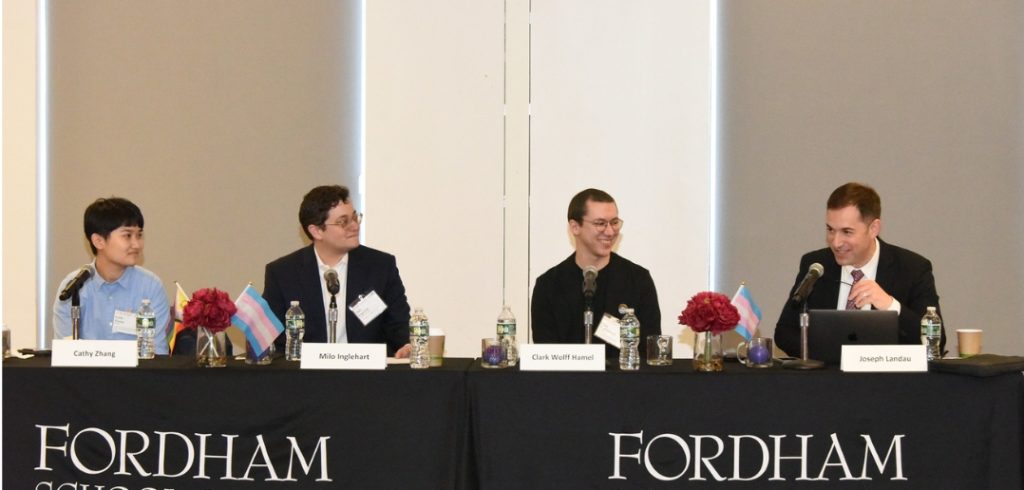The symposium, “The Next Generation: Tracing the Rights of LGBTQ+ Youth and Laying the Foundation for the Future,” explored pressing issues facing LGBTQ+ youth today. The event was organized by Fordham Law’s two LGBTQ+ student affinity groups, Fordham OUTLaws and Fordham Advocates for Trans* Law Students (ATLS).
Moderating the second panel, “Under Attack: LGBTQ+ Rights on the Ground,” about what it’s like for advocates working with LGBTQ+ families in this challenging political climate, incoming Fordham Law Dean and current Associate Dean for Academic Affairs Joseph Landau asked lawyers and advocates with Empire Justice Center, PFLAG, the Transgender Legal Defense and Education Fund, and the Transgender Law Center how they are working to broaden the movement for LGBTQ+ youth rights.
“Movements are more than just legal strategies—they’re a collective endeavor involving both lawyers and non-lawyers,” Landau said. “In light of that, what strategies should we employ to collaborate with a diverse range of individuals, regardless of their legal expertise, to effectuate meaningful change?”
The panelists offered several strategies, from working with advocacy and activist groups, providing resources for people to advocate for themselves, making legal resources more accessible, and encouraging constituents—including LGBTQ+ allies—to reach out to legislators on important legal issues.
Milo Inglehart, a staff attorney at the Transgender Law Center, also described some of the challenges of working on these issues directly with clients. He described an “openly hostile” environment facing the clients he serves, potentially even affecting their physical safety.
“We have to do a lot of safety planning,” said Inglehart. “We got a security detail for our hearing where we’d have families and healthcare providers there, just to make sure that everyone was physically safe.”
“As another measure, our families are all proceeding under pseudonyms, just because there is a very real danger both from anti-trans individual actors, and from the government, who, as some of you may know, has already tried things like investigating families of trans kids under child protective service laws,” Inglehart added.
Clark Wolff Hamel, director of education programs at the New York office of PFLAG, the nation’s largest organization dedicated to supporting, educating, and advocating for LGBTQ+ people, described what it was like to work in a state like New York, which does have certain protections for LGBTQ+ youth but has still faced challenges in recent years.
“I’ve been doing this for about six years now and this year has been really starkly different in seeing the amount of just blatant disregard for the law,” Hamel said. “I’m working with multiple schools right now that are doing extraordinarily illegal things in schools and continue to do them even after being told that it is illegal to do that as a New York City public school teacher or to do that as a New York City public school administrator.”
The two other panels in the symposium were “Finding Family: Looking at the History of LGBTQ+ Youth” and the “Please Say Gay and Trans: Navigating the Future of LGBTQ+ Youth Rights,” and included leaders from the Human Rights Campaign, Lambda Legal, and the National Center for Lesbian Rights.

